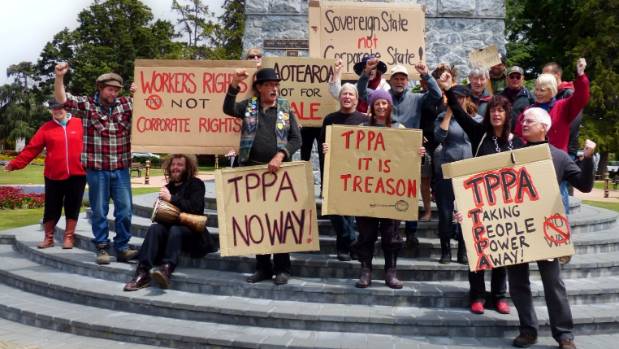NZ ’could not’ apply water tax - diplomat

Radio NZ | 30 November 2017
NZ ’could not’ apply water tax - diplomat
by Craig McCulloch
National said the revelation proved Labour’s disorganisation, but Trade Minister David Parker said he was well aware of the issue.
Diplomat Vangelis Vitalis this morning told a select committee that an export tax on water would contravene the new Trans Pacific Partnership and other agreements.
"If New Zealand wanted to apply an export tax on water, it could not do so," he said.
"Not simply as a consequence of this agreement, but through several other agreements that we have at present as well."
The coalition agreement signed by Labour and New Zealand First includes a policy to introduce a royalty on exports of bottled water.
Mr Parker told reporters he’d "always known" that "distortionary export taxes" were prohibited by all trade agreements.
The Government would explore alternative remedies to meet its goal, he said.
"There’s more than one way to meet our ambition."
The Government had yet to look into the issue in much detail, but Mr Parker said there could be regulatory options under the Resource Management Act (RMA).
Foreign Minister Winston Peters disputed the suggestion that a royalty on water exports would breach trade deals.
"We’re a sovereign nation and you’re seeing a restoration of our sovereignty."
National’s leader Bill English said it was yet another example of Labour making bold commitments and failing to back them up.
"This is now starting to look like a bit of a pattern where they say they’re going to do something and then find in the real world, it’s quite hard to do."
He said while it "may be possible" for the government to take action under the RMA, that was not what Labour or New Zealand First had promised.
"The commitment’s been made. It’s really clear. It now looks like they’ll have to back off it."
Mr Vitalis said many countries did have export taxes, including on agricultural products, which can drive up global prices.
"One of our key objectives in many of our negotiations has always been to try restrict that."
Governments could manage water using the Resource Management Act and consenting processes, he said.
Parties scuffle for TPP credit
Mr Vitalis was also questioned at length over his role as chief negotiator for the new Trans Pacific Partnership.
The deal is all but agreed, with only a few areas still to be resolved.
Mr Vitalis told MPs the Labour-led government had given him a new mandate to extract the country from the Investor State Dispute Settlement (ISDS) provisions.
"I was given a clear and unambigious message around that."
He was given further direction once it became clear that would not be possible due to the time constraints, he said.
"The clear message I also got was, ’Well, you better narrow the scope and you better keep pursuing ways to carve New Zealand out of this.’"
Mr Vitalis said debate over the clause was "particularly challenging" and only resolved at "the last minute".
One country had been a "very significant obstacle" and did not want to give the clauses up, he said.
"They were very clear about that right until the end ... They regarded that as a major commercial advantage and therefore were unwilling to compromise on that."
Pressed by former Foreign Minister Gerry Brownlee, Mr Vitalis confirmed that the matter had always been "a live issue", including before Labour took over.
"It is true that the issue of scope had been an ongoing issue all the way through negotiations."
Other countries had also tried to renegotiate market access, but New Zealand was not willing to entertain that, Mr Vitalis said.
"That was a challenging position for us ... to sustain right through this process including right to the end in November."
No date had been agreed for a signing, but there had been some discussion of it happening in the first half of next year, possibly as early as February or March.
New Zealand would like it signed "as soon as possible", he said. Four outstanding items have yet to be resolved.





